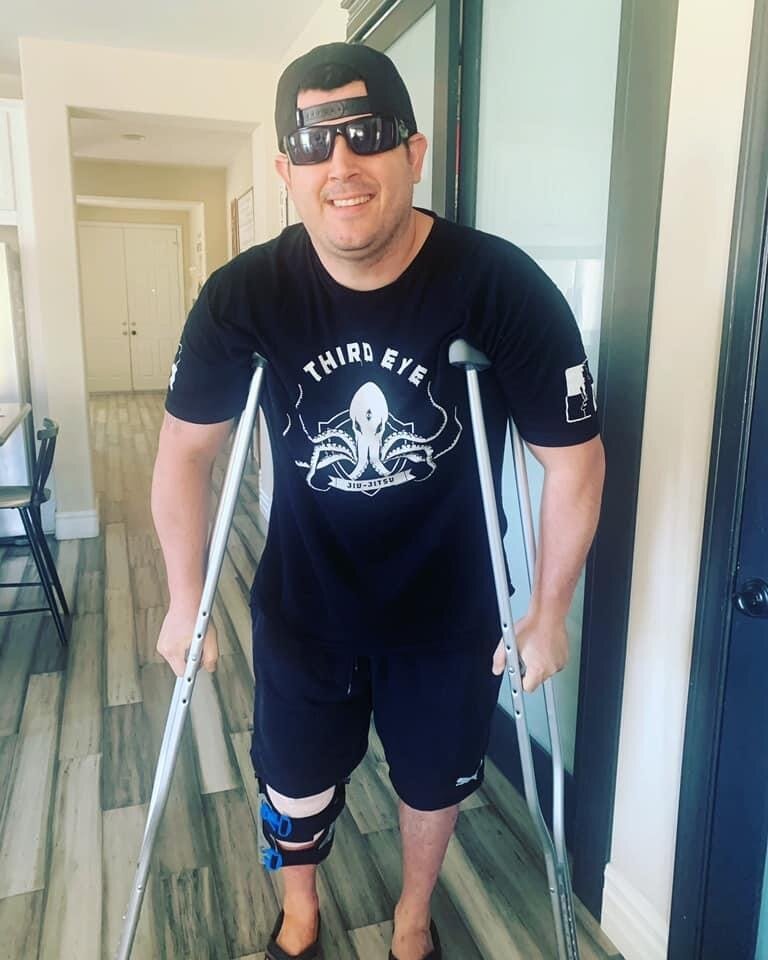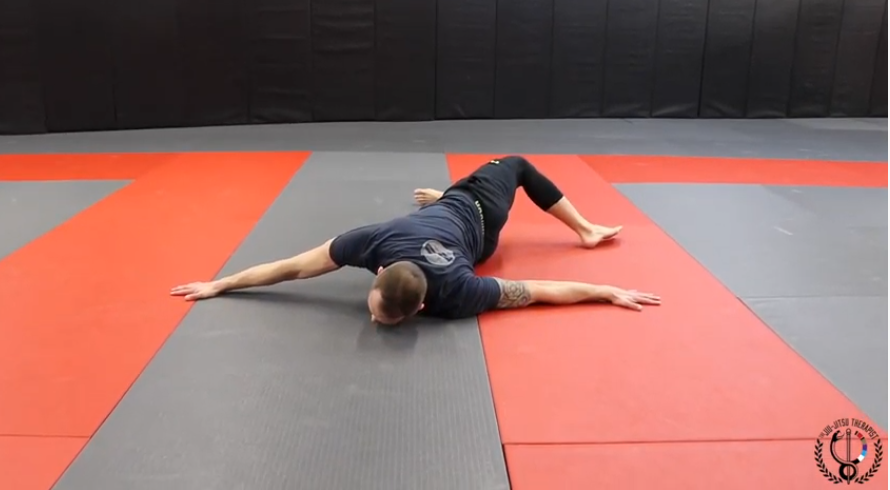5 Ways To Progress In BJJ When You're Injured.
When you're injured one of the most frustrating things is that you can't train full-time and in full capacity like you normally do. So how do you keep from losing your mojo?
Sure, you can't roll like usual, depending on the severity of your injury, but there are a lot of things you can do to keep your mind and body activated while you recover. Better to recover fast and get back to peak performance than be nursing a recurring injury that is keeping you off your game.
Matt Viega host of The Sports Trolls Podcast had to take some time off to heal his ACL injury.
1. Study BJJ Technique
Keep your brain on Jiu-Jitsu! Study the positions you know and keep those memories fresh.
BJJ YouTube is a goldmine. Watch Danaher, Chewy, Gracie Breakdown, and others. Hell, even get in the gym and watch people roll. You can learn a lot that way.
Visualize positions. Professional athletes use visualization as a powerful tool to achieve results. You can visualize yourself winning to get pumped up, but you can also visualize very specific techniques and movements. While it's obviously no substitute for the real thing, for those who master this skill, it could be the thing that keeps your muscle memory alive while you can't train on the mat.
Sometimes these little breaks in our training regimen are actually good for improvement because we get a chance to really breathe and think deeply about the techniques, why and how they work, and where our blind spots are.
2. Develop a Solid Game Plan for Your Comeback
Don't try to get back in the game by doing random techniques. Studying YouTube videos is great, but doing a different position and practicing in different ways will just leave you scatterbrained and recovering slowly.
Listen to your body and figure out where this injury has hurt you the most. I don't mean in your big toe, I mean has it crushed your ability to practice passing closed guard? Work on that first. Train your weak spots methodically to get back to the level you want.
Review the motions in your head until you can do them again, and drill the basics. This will get your techniques crisp and will really help with your motivation. Get some quick wins by revisiting techniques you haven't been able to do in a while.
Caveat: If these are the positions that put a lot of pressure on your injury and you're not fully healed, be aware of the potential to make things worse. Always tell your rolling partner about existing or healing injuries.
3. Train with Weights and Use Modified Exercises
So many BJJ practitioners neglect weight training for one reason or another, and if that's you, this is the time to pick it back up.
If you always weight train, good for you. Time to hit the weights a bit harder.
With less time rolling, you might find a lot of pent-up energy and you need to get that out somehow. You might be feeling frustrated or irritated! Take note that that can be dealt with through extra exercise.
There are some great resources out there for weight training programs specifically designed for Jiu-Jitsu. One of the great resources is Joe Clark and of course, you can go down an endless rabbit hole of other YouTube videos.
If you're lucky enough to afford a strength coach or trainer at your local gym, ask them to advise you on how to get the most out of your strength training while helping you have a speedy recovery.
Maybe you can't do your favorite lifts because of your injury. Modify, modify, modify! There is almost always another variation of each lift or movement that you can still do. For a finger injury, modifying your grip or using a lifting strap, or for a leg injury do lifts from seated instead of standing.
Don't forget flexibility! You don't want to get back on the mat stiff as a board because all you've been doing in your off-time is lifting heavy.
Weight training for BJJ is a great way to bridge the gap until your comeback and keep your body active all the while.
4. Work Around the Injury (But Use Protective Gear!)
Maybe you feel like a nerd wearing wrestling shoes to protect your toes, or wrapping your hand up like a mummy, but if that's what you need to do to train other positions, go for it.
Don't put pressure on your injury! If you have a hand injury, keep the hand in your gi and work without it. The protection is only there as a backup -- it doesn't mean you can go full steam ahead.
At first, you will feel so incapable, it might be frustrating. But stick with it and maybe soon you'll be feeling like a ninja, taking down adversaries with one hand tied behind your back!
You'll realize how dependent you are on using both arms or both legs. Imagine what an advantage it could be if you could do techniques with one side and leave the other side free to maneuver, while your opponent is scrambling to guard you with all four limbs.
After you heal, be sure to practice the same way with your previously injured side. It's always important to balance both sides, and you can really increase your skills this way too.
5. Use Physical Therapy to Help you Recover
To help ensure the fastest recovery possible, do everything you can to get your injury feeling better. There are many resources and facilities that can help you directly treat the injury. Every injury is different, so there's too much to cover here. That would be another article for another time.
The Jiu-Jitsu Therapist Youtube channel is a great place to get PT tips for BJJ injury treatment and prevention.
Generally, remember RICE: Rest, ice, compression, elevation. Aim to reduce swelling and inflammation. Keep the joint stable, and when you're feeling better, work on the movements slowly and carefully.
I always recommend working with a professional physical therapist whenever possible. If it's not possible, check out https://thereadystate.com/ and Kelly Starrett's videos for your particular injury.
The Waiting Game
Remember that getting injured is normal! Don't get discouraged. If you never got injured training BJJ, chances are you weren't pushing yourself very hard at all. Not to say you should try to get injured, but just keep in mind that injuries are part of the game for any serious athlete.
While you're recovering from a BJJ injury, it's important to keep your head in the game and keep your body active. Motivation is really important here, to look forward to getting back full time, develop a plan and work it as well as you can.
Such a technical sport lends itself nicely to studying the subtle details of masters on video, and small improvements can make a big difference. Thinking about BJJ and visualizing techniques will keep your mind sharp.
At the same time, train for strength and flexibility. Every injury is different, so it depends on what you're dealing with, but be sure to get the extra energy out and find ways to increase your strength in areas that you've been neglecting.
When you come back, you're going to be more motivated than ever, working extra hard to advance and you'll see that increased motivation sometimes has huge benefits.
In the meantime, it might not be a bad idea to pick up an insurance program for only a few bucks per month that will help you financially with your BJJ injuries and cover the upfront costs of treatment while you plan your comeback.



